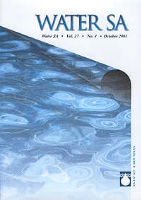
WATER SA
Scope & Guideline
Exploring the intersection of technology and water sustainability.
Introduction
Aims and Scopes
- Water Quality Assessment and Management:
The journal emphasizes studies related to evaluating and managing water quality across different ecosystems, including freshwater, estuarine, and wastewater environments. - Hydrological Modeling and Analysis:
Research on hydrological processes, modeling techniques, and water resource management strategies is a core focus, aiming to enhance understanding of water dynamics in various catchments. - Sustainable Water Resource Management:
WATER SA promotes research that contributes to sustainable practices in water usage, including irrigation efficiency, stormwater management, and the integration of alternative water sources. - Impact of Climate Change on Water Resources:
The journal frequently addresses the implications of climate change on water availability, quality, and ecosystem health, offering insights into adaptive management strategies. - Innovative Water Treatment Technologies:
Research on novel techniques for water treatment and pollution mitigation is highlighted, including studies on bioremediation, filtration, and chemical treatment methods. - Community Engagement and Socio-Economic Aspects:
The journal values the socio-economic dimensions of water management, including community perceptions, policy implications, and the role of local practices in sustainable water use.
Trending and Emerging
- Integrated Water Resource Management (IWRM):
There is a marked increase in research focused on IWRM, highlighting the importance of holistic approaches that consider social, economic, and environmental factors in water management. - Climate Change Adaptation Strategies:
Recent publications emphasize adaptive strategies for managing water resources in the face of climate change, including resilience planning and adaptive governance frameworks. - Microbial and Chemical Contaminant Studies:
Emerging research on microbial and chemical contaminants in water sources, including antibiotic resistance and micropollutants, is gaining attention due to public health implications. - Technological Innovations in Water Treatment:
The journal is increasingly featuring studies on advanced water treatment technologies, such as membrane filtration, bioremediation, and nanotechnology applications. - Public Engagement and Policy Frameworks:
There is a growing focus on the role of public engagement, community perceptions, and policy frameworks in enhancing water governance and resource sustainability. - Hydrological Responses to Land Use Changes:
Research examining the impacts of land use changes on hydrological processes and water quality is trending, reflecting an interest in sustainable land-water interactions.
Declining or Waning
- Traditional Water Supply Systems:
Research focused on conventional water supply systems has decreased, possibly due to a growing emphasis on innovative and decentralized solutions in response to water scarcity. - Basic Water Quality Parameters:
Studies centered on basic water quality parameters have waned as more complex and integrative approaches, such as life cycle assessments and comprehensive pollutant analyses, gain traction. - Historical Water Use Practices:
There is less emphasis on historical water use practices as the journal shifts towards contemporary issues and future-focused solutions in water management. - General Environmental Monitoring:
The focus on broad environmental monitoring without specific applications or implications has diminished, with more targeted studies gaining prominence. - Aquatic Biodiversity Studies:
While still relevant, research specifically focused on aquatic biodiversity without direct links to water quality management or ecosystem services appears to be less common in recent publications.
Similar Journals
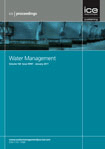
PROCEEDINGS OF THE INSTITUTION OF CIVIL ENGINEERS-WATER MANAGEMENT
Advancing Sustainable Solutions in Water ManagementPROCEEDINGS OF THE INSTITUTION OF CIVIL ENGINEERS-WATER MANAGEMENT is a prestigious journal published by Emerald Group Publishing Ltd, dedicated to advancing the field of water management within civil engineering. With an ISSN of 1741-7589 and an E-ISSN of 1751-7729, this journal delivers peer-reviewed research that spans the critical intersections of water science and technology, contributing valuable insights into sustainable water management practices. As evidenced by its ranking in the 2023 Scopus categories, where it holds the Q3 quartile in Water Science and Technology, and a respectable position among its peers, the journal remains a vital resource for researchers, professionals, and students in the field. Though it is not an open-access journal, it offers accessible subscription options that facilitate worldwide dissemination of knowledge, enhancing its role as a fundamental reference point for cutting-edge developments in water management. For those looking to publish or stay updated on the latest research trends, this journal serves as an essential platform for promoting innovation and sustainable practices in civil engineering and water resources management.
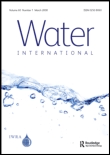
WATER INTERNATIONAL
Pioneering Research for Sustainable Water SolutionsWATER INTERNATIONAL is a leading journal in the realms of water science and policy, published by Routledge Journals, Taylor & Francis Ltd. With its ISSN 0250-8060 and E-ISSN 1941-1707, the journal has maintained a robust scholarly presence since its inception in 1975, with contributions focused on management, monitoring, and policy pertaining to water resources. Currently convening from 1975 to 2024, WATER INTERNATIONAL is recognized for its significant impact, reflected in its Q2 category rankings within Environmental Science sectors—ranked #157/399 in Management, Monitoring, Policy and Law, and #103/261 in Water Science and Technology. The absence of an open access option does not diminish its importance, as it continues to serve as a crucial platform for interdisciplinary researchers, professionals, and students aiming to address the challenges surrounding water governance and sustainability. With its focus on innovative methodologies and policy-oriented research, the journal stands at the forefront of advancing knowledge in water resource management.

Water Resources
Exploring the depths of water science and technology.Water Resources, a prominent journal published by MAIK NAUKA/INTERPERIODICA/SPRINGER, focuses on the critical and evolving field of water science and technology. Established in 1976 and with a long-standing commitment to advancing knowledge, this journal explores interdisciplinary research that addresses the challenges surrounding water resource management, quality, and sustainability. With an impact factor positioned within the Q3 category of its field, it holds a notable Scopus rank (#181/261) in Environmental Science, emphasizing its role in driving scholarly discourse. While currently not open access, Water Resources provides vital insights for researchers, professionals, and students, making it an essential resource for those seeking to innovate and implement effective water management solutions. To stay ahead in a domain that is increasingly paramount to global sustainability efforts, consider engaging with the latest research published in this vital journal.

Meteorology Hydrology and Water Management-Research and Operational Applications
Transforming research into practical applications for water resources.Meteorology Hydrology and Water Management - Research and Operational Applications is a prominent academic journal published by the Institute of Meteorology and Water Management, based in Warsaw, Poland. With a focus on advancing the understanding and application of meteorology, hydrology, and water resource management, this journal plays a crucial role in disseminating high-quality research that contributes to both theoretical knowledge and practical applications in these pivotal fields. Although it operates under traditional access options, the journal is dedicated to providing valuable insights and solutions to challenges faced by researchers, practitioners, and policymakers in water management and environmental studies. Researchers keen on exploring innovative methodologies, operational tools, and empirical studies will find this journal an essential resource in enhancing their work and understanding of the dynamic interplay between meteorological phenomena and water resource management. The journal's commitment to maintaining rigorous scholarly standards ensures that every publication drives impactful dialogues within the community and beyond.

Hydrology Research
Unleashing knowledge for sustainable water practices.Hydrology Research, a leading academic journal published by IWA Publishing, is dedicated to advancing the field of water science and technology. With an impressive impact factor and a Q2 ranking in its category, the journal plays a pivotal role in disseminating innovative research and practices in hydrology. Established in 1973 and transitioning to an Open Access model in 2020, it provides unrestricted access to high-quality articles that cover a broad spectrum of topics, including hydrological processes, water management, and environmental impact assessments. Situated in Denmark, Hydrology Research continues to thrive as an essential platform for researchers, professionals, and students alike, encouraging the exchange of ideas that contribute to sustainable water solutions worldwide. With a comprehensive coverage of research converging from 1973 to 2024, it stands as a testament to ongoing progress in the water science community.
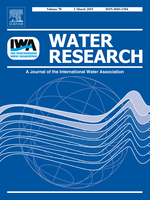
WATER RESEARCH
Unraveling the complexities of water quality and conservation.WATER RESEARCH, published by Pergamon-Elsevier Science Ltd, is a premier international journal dedicated to the advancement of knowledge in the interdisciplinary field of water science and technology. With a significant impact factor, WATER RESEARCH holds a distinguished position, consistently ranking in the top quartile (Q1) across multiple categories including Civil and Structural Engineering, Environmental Engineering, and Pollution. Established in 1967 and set to continue its legacy until at least 2024, this journal provides a vital platform for researchers and professionals to disseminate cutting-edge findings related to water sustainability, quality, and management. Although the journal follows a traditional access model, its commitment to disseminating impactful research ensures that it remains an essential resource for academia and industry alike. With a rigorous selection process, the journal includes articles that significantly contribute to the understanding and resolution of global water-related challenges, making it an invaluable asset for researchers, students, and practitioners engaged in this critical area of study.

Water Research X
Advancing sustainable solutions for our most precious resource.Water Research X is a prestigious journal published by ELSEVIER, focusing on the dynamic fields of water science and technology, pollution, ecological modeling, and waste management. Since its inception in 2018, this Open Access journal has become a cornerstone resource for researchers and professionals dedicated to advancing our understanding and management of water resources. Based in the United Kingdom, Water Research X holds an impressive ranking within the Scopus metrics, positioned in the Q1 category across multiple relevant disciplines, including Environmental Science, with a notable rank of 10/261 in Water Science and Technology and 3/41 in Ecological Modeling. This reflects its commitment to disseminating high-quality research that informs policy, supports sustainable practices, and fosters innovation in water management.
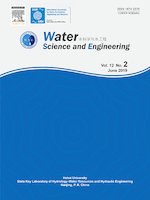
Water Science and Engineering
Transforming Water Challenges into Engineering TriumphsWater Science and Engineering, published by ELSEVIER, is a premier open access journal that has been disseminating vital research in the realms of civil and structural engineering as well as ocean engineering since 2008. With its ISSN 1674-2370 and E-ISSN 2405-8106, this journal plays a crucial role in advancing knowledge and innovation within the sector, evidenced by its impressive rankings in Scopus—holding the 15th position out of 105 in Ocean Engineering and 76th out of 379 in Civil and Structural Engineering, placing it in the 86th and 80th percentiles, respectively. Attaining a Q1 classification in both categories for 2023 highlights its importance and influence in the academic and professional communities. The journal addresses a broad spectrum of topics integral to water sciences, offering significant insights for researchers, professionals, and students alike. With a convergence period spanning from 2010 to 2024, it continues to explore contemporary issues and advancements, providing a pivotal platform for the dissemination of research. The journal is accessible to a global audience, reaffirming its commitment to fostering open access and enhancing accessibility to vital scientific literature.

Water Conservation Science and Engineering
Pioneering Research in Water Science and EngineeringWater Conservation Science and Engineering, published by SPRINGERNATURE, is a vital academic journal dedicated to advancing the fields of environmental engineering, ocean engineering, waste management, and water science and technology. Since its inception in 2016, the journal has quickly established itself within the academic community, achieving a commendable Q3 ranking across multiple categories in 2023. With an ISSN of 2366-3340 and an E-ISSN of 2364-5687, it is accessible to a global readership eager to explore the latest research and innovations in water conservation and sustainable practices. Although currently not open access, the journal is committed to publishing high-quality scholarly articles that provide insights into effective water management strategies, innovative engineering solutions, and the critical importance of preserving our water resources. Based in Singapore, Water Conservation Science and Engineering aims to foster interdisciplinary collaboration among researchers, professionals, and students, making it an essential resource for anyone passionate about environmental sustainability and preservation.
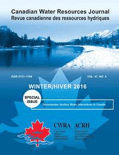
Canadian Water Resources Journal
Unveiling critical insights in hydrology and policy.Canadian Water Resources Journal, published by Taylor & Francis Inc, is a leading academic journal dedicated to the field of water science and technology. With a significant history dating back to its inception in 1976, the journal offers a platform for high-quality, peer-reviewed research that addresses critical issues in water resources management, hydrology, water quality, and policy. The journal is recognized for its valuable contributions to the field, exemplified by its classification in the Q2 category for Water Science and Technology and holding a respectable rank of #137 out of 261 in the Scopus Environmental Science category. While it does not currently offer open access, its articles remain accessible through various institutional subscriptions, ensuring that professionals, researchers, and students stay updated with the latest advancements and discussions in water resources. As it converges towards its ongoing publication commitment through 2024, the Canadian Water Resources Journal remains an essential resource for those engaged in the pursuit of sustainable water management solutions.